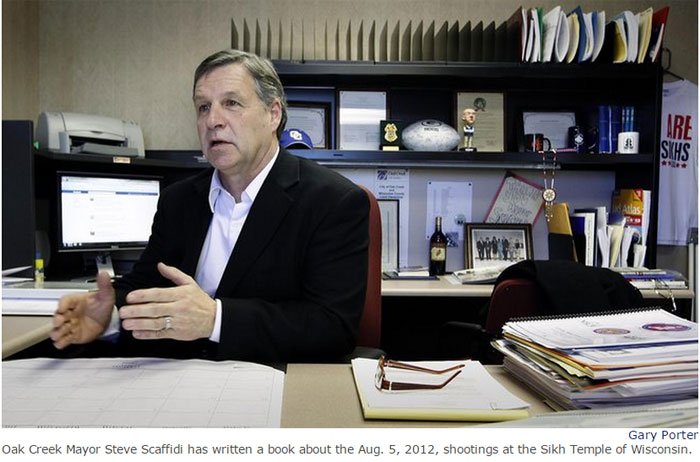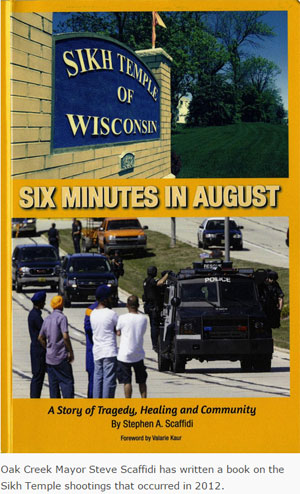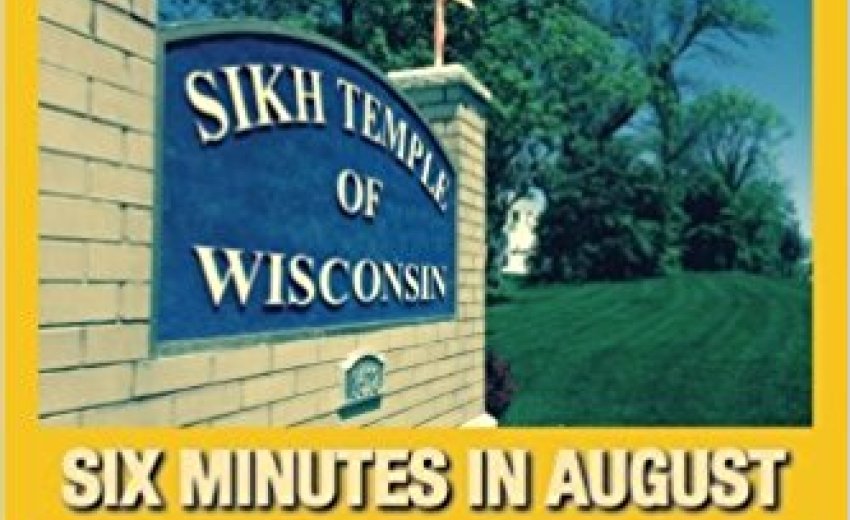

There wasn't any handbook to guide Oak Creek Mayor Steve Scaffidi in the aftermath of the Aug. 5, 2012, shootings at the Sikh Temple of Wisconsin.
A lone gunman burst into the temple, killed six people and wounded four others before being brought down by a single rifle shot from a police officer. The gunman killed himself.
While first responders from across the region did their jobs, Scaffidi had to do his, engaging in on-the-fly crisis management while also beginning the long process of healing a shattered community.
He had been on the job only four months. The experience shook him to his core.
Scaffidi has now written about those events in "Six Minutes in August: A Story of Tragedy, Healing and Community." Scaffidi published the book through his small-business marketing company, Marketpoint Media. It's available on Amazon. A portion of the proceeds will go to Oak Creek Cares, a fund within the Greater Milwaukee Foundation.
He wrote the first few chapters as therapy and then the project expanded.
"It's history," he said. "It's talking about some bigger issues that plague our society."
There are also personal stories, about those affected by the tragedy and a community coming together, people reaching out to neighbors most had never met — members of the Sikh congregation.
In part, the book is a guide for other leaders who might be thrust into what was once an almost unthinkable situation — a mass shooting in a mostly peaceful community. But the unthinkable has now become a more common occurrence. Scaffidi writes about attending a U.S. Conference of Mayors and forming a bond with mayors from four other cities that endured similar tragedies.
"It was a small club, one you don't really want to be a part of," he writes.
The book is dedicated to the six Sikh worshippers who were killed. It details the violent events that erupted and 6 crucial minutes, from the arrival of Oak Creek Police Lt. Brian Murphy, who took on and was badly wounded by the gunman, a white supremacist named Wade Michael Page, to the final moments. Officer Sam Lenda wounded Page, who then turned a gun on himself.
"Those six minutes ended the incident on Aug. 5, 2012, but the real impact of that day reaches far beyond those directly affected, or even to the families who were devastated by violence and hate," Scaffidi writes.
Oak Creek is part of a larger mosaic of American violence, mass shootings erupting in places like Blacksburg, Va., Aurora, Colo., and Newtown, Conn.
On the night of the violence in his city, Scaffidi received two important phone calls, one from President Barack Obama, who was calm and reassuring, and the other from Steve Hogan, the mayor of Aurora. Only two weeks earlier, that city had endured a mass shooting inside a movie theater that left 12 people dead and 70 injured.
Hogan's advice: "Talk about what you know, and don't speculate."
Scaffidi has sought to pass on that advice to others.
"The worst thing you can do is hide," he said.
Not only does the media seek information, he said, so do residents.
"They want to do know everything is OK," he said. "They want to hear it from their elected leader."
Scaffidi writes of the need for communities to have emergency preparedness plans in place, not just for first responders, but also for those who will be communicating with the public. He said local governments should also have a presence on social media so that information can be spread quickly.
"Right now in Milwaukee County, major communities don't have a Facebook page," he said. "That just blows me away. I think every community needs to have that in place." Oak Creek has a Facebook page.
Scaffidi said Oak Creek came through the tragedy and is perceived as having done things the right way, both because of the response of local law enforcement and the response of the members of the Sikh temple.
In one telling scene, Scaffidi writes about how he and Oak Creek Police Chief John Edwards met with temple members in the cafeteria at the local Salvation Army on the day after the shooting.
"As I sat there that day and listened to the questions and the calm that was displayed in spite of the extreme brutality that was enacted upon them just hours earlier, it was hard not to want to follow that lead," he writes.
In the days and months after the tragedy, Scaffidi and others formed bonds with Sikh temple members.
Scaffidi represented Oak Creek at gatherings with Obama, first lady Michelle Obama and Vice President Joe Biden.
He also spoke of the need to grapple with gun violence.
"I respect the Second Amendment," he said. "I'm a hunter and own guns. I also understand the need for reasonable limits. I'm never going to accept the conversation that says ban all guns or the opposite. There have to be reasonable, responsible limits to things."
